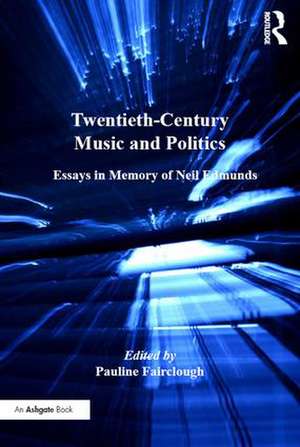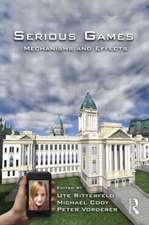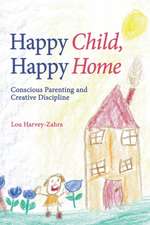Twentieth-Century Music and Politics: Essays in Memory of Neil Edmunds
Editat de Pauline Faircloughen Limba Engleză Hardback – 8 ian 2013
| Toate formatele și edițiile | Preț | Express |
|---|---|---|
| Paperback (1) | 469.34 lei 6-8 săpt. | |
| Taylor & Francis – 3 oct 2016 | 469.34 lei 6-8 săpt. | |
| Hardback (1) | 1114.88 lei 6-8 săpt. | |
| Taylor & Francis – 8 ian 2013 | 1114.88 lei 6-8 săpt. |
Preț: 1114.88 lei
Preț vechi: 1359.61 lei
-18% Nou
Puncte Express: 1672
Preț estimativ în valută:
213.33€ • 223.33$ • 176.52£
213.33€ • 223.33$ • 176.52£
Carte tipărită la comandă
Livrare economică 05-19 aprilie
Preluare comenzi: 021 569.72.76
Specificații
ISBN-13: 9781409400264
ISBN-10: 1409400263
Pagini: 312
Dimensiuni: 156 x 234 x 19 mm
Greutate: 0.62 kg
Ediția:Revised
Editura: Taylor & Francis
Colecția Routledge
Locul publicării:Oxford, United Kingdom
ISBN-10: 1409400263
Pagini: 312
Dimensiuni: 156 x 234 x 19 mm
Greutate: 0.62 kg
Ediția:Revised
Editura: Taylor & Francis
Colecția Routledge
Locul publicării:Oxford, United Kingdom
Cuprins
Contents: Foreword, Robin Milner-Gulland; Preface; Introduction, Pauline Fairclough; ’A world of Marxist orthodoxy’? Alan Bush’s Wat Tyler in Great Britain and the German Democratic Republic, Joanna Bullivant; Stravinsky’s Petrushka: modernizing the past, Russianizing the future, or, how Stravinsky learned to be an exile, Jonathan Cross; Détente to Cold War: Anglo-Soviet musical exchanges in the late Stalin period, Pauline Fairclough; Front theatre, musical films and the war in Nazi cinema, Guido Heldt; ’Those damn foreigners’: xenophobia and British musical life during the first half of the 20th century, Erik Levi; ’An angry ape’: some preliminary thoughts about Orango, Gerard McBurney; A bridge between two worlds: the founding years of the Warsaw Autumn Festival, Bogumila Mika; Winning hearts and minds? Soviet music in the Cold War struggle against the West, Simo Mikkonen; Preserving the façade of normal times: musical life in Belgrade under the German occupation (1941-44), Melita Milin; Musical commemorations in post-Civil War Spain: Joaquin Rodrigo’s Concierto Heroico, Eva Moreda Rodriguez; The radicalization and ghettoization of music in the General Government, Katarzyna Naliwajek; 'I only need the good old Budapest': Hungarian cabaret in wartime London, Florian Scheding; Irish nationalism, British imperialism, and the role of popular music, Derek B. Scott; Shostakovich as film music theorist, Joan Titus; Diaspora, music, and politics: Russian musical life in Shanghai during the inter-war period, Hon-Lun Yang; Select bibliography; Index.
Notă biografică
Pauline Fairclough is Senior Lecturer in Music at the University of Bristol. She has published widely on Shostakovich and Soviet music, and is currently writing her monograph on early Soviet musical culture, Classics for the Masses.
Recenzii
’In general terms, this is a volume that will be greeted enthusiastically by a wide range of scholars and which will have resonance for historians and sociologists as well as musicologists.’ Jan Smaczny, Queen’s University Belfast, UK 'Music historians will of course find the whole collection fascinating but individual chapters throw light on some little-explored areas, increasing its value.' Society for Co-operation in Russian and Soviet Studies Information Digest '... an original and thought-provoking collection on an impressive range of topics and a fitting tribute to a scholar whose life ended so prematurely.' Slavic Review 'This is a volume of broad appeal and high calibre, which demonstrates the great rewards close historical analysis and an extended approach can bring to the study of music in a range of contexts. It is also a poignant, yet vivid, memorial to a gifted scholar and teacher for whom music was as expansive as the historical setting from which it is inseparable.' Fontes Artis Musicae
Descriere
When considering the role music played in the major totalitarian regimes of the century it is music's usefulness as propaganda that leaps first to mind. But as this volume demonstrates, there is a complex relationship both between art music and politicised mass culture, and between entertainment and propaganda. Nationality, self/other, power and ideology are the dominant themes of this book, while key topics include: music in totalitarian regimes; music as propaganda; music and national identity; émigré communities and composers; music's role in shaping identities of 'self' and 'other' and music as both resistance to, and instrument of, oppression.






